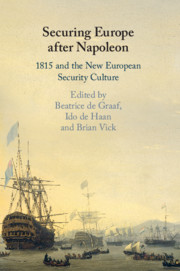Book contents
- Securing Europe after Napoleon
- Securing Europe after Napoleon
- Copyright page
- Contents
- Contributors
- Vienna 1815
- Part I Conceptualisations
- Part II Institutions and Interests
- Part III Threats
- 9 Constructing an International Conspiracy
- 10 Security and Transnational Policing of Political Subversion and International Crime in the German Confederation after 1815
- 11 The Papacy, Reform and Intervention
- 12 From Augarten to Algiers
- Part IV Agents and Practices
- Index
10 - Security and Transnational Policing of Political Subversion and International Crime in the German Confederation after 1815
from Part III - Threats
Published online by Cambridge University Press: 25 January 2019
- Securing Europe after Napoleon
- Securing Europe after Napoleon
- Copyright page
- Contents
- Contributors
- Vienna 1815
- Part I Conceptualisations
- Part II Institutions and Interests
- Part III Threats
- 9 Constructing an International Conspiracy
- 10 Security and Transnational Policing of Political Subversion and International Crime in the German Confederation after 1815
- 11 The Papacy, Reform and Intervention
- 12 From Augarten to Algiers
- Part IV Agents and Practices
- Index
Summary
This chapter analyses the development of transnational policing as a crucial element of the federal–transnational security regime of the German Confederation, which the Congress of Vienna had established in 1815 to maintain external and internal security. Narratives of cross-border political subversion and crime triggered new modes of political and transnational policing in nineteenth-century Europe, resulting in both formal police cooperation as well as in various actors and techniques of transnational policing and securitisation. Through the ‘commission-mode’ and the ‘conference-mode’, policing agencies aimed at intelligence, surveillance and suppression, and contributed to the production and dissemination of a systematic knowledge base on political subversion and international crime. In the process, they influenced the development of security narratives and logics and practices of securitisation, and constituted important elements of the emerging European security culture.
Keywords
- Type
- Chapter
- Information
- Securing Europe after Napoleon1815 and the New European Security Culture, pp. 193 - 213Publisher: Cambridge University PressPrint publication year: 2019
- 1
- Cited by

